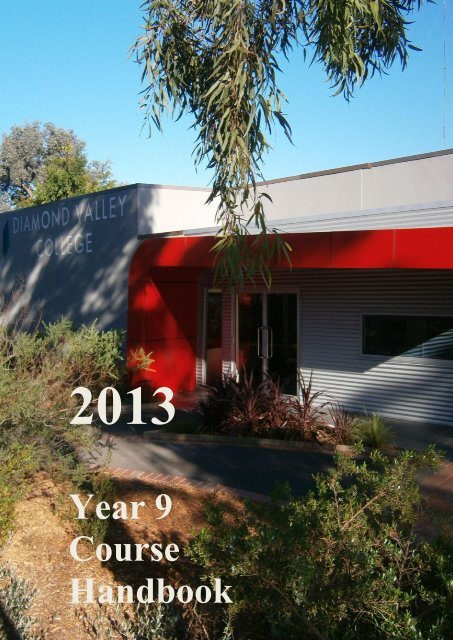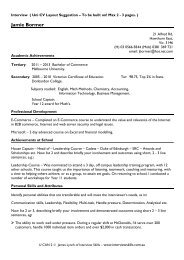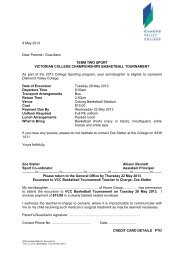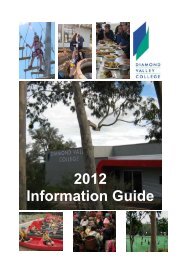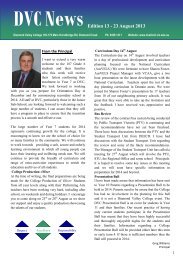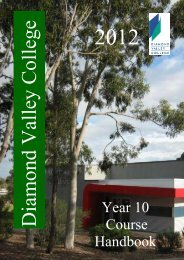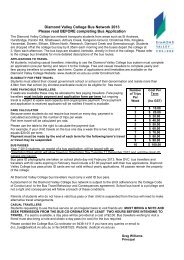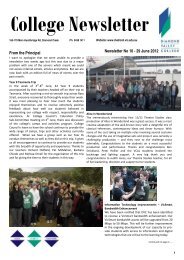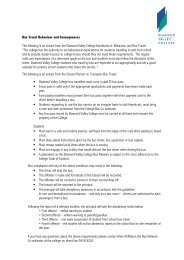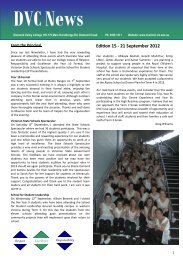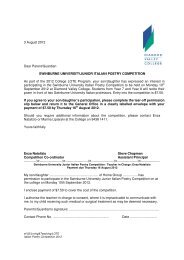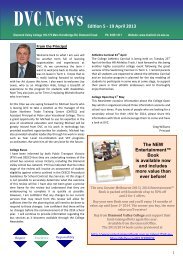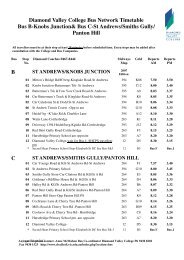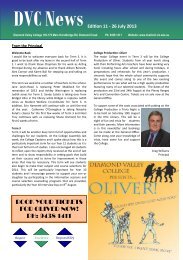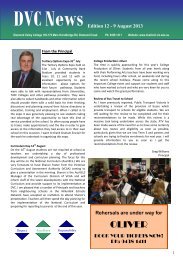Year 9 Program 2013 - Diamond Valley College
Year 9 Program 2013 - Diamond Valley College
Year 9 Program 2013 - Diamond Valley College
Create successful ePaper yourself
Turn your PDF publications into a flip-book with our unique Google optimized e-Paper software.
<strong>2013</strong><br />
<strong>Year</strong> 9<br />
Course<br />
Handbook
<strong>2013</strong> <strong>Diamond</strong> <strong>Valley</strong> <strong>College</strong> <strong>Year</strong> 9 Course Handbook 2
Table of Contents<br />
Introduction ..................................................................................................................... 4<br />
Material Intensive Elective Charges ............................................................................... 5<br />
The Junior School Team 2012 ................................................................................ 6<br />
Expectations of Students ................................................................................................. 6<br />
General Information ................................................................................................ 6<br />
<strong>Year</strong> 9 <strong>Program</strong> <strong>2013</strong> ...................................................................................................... 7<br />
Compulsory Subjects ...................................................................................................... 8<br />
English-EN09 .......................................................................................................... 8<br />
Mathematics-MA09 ................................................................................................ 8<br />
Science-SC09 .......................................................................................................... 9<br />
History -HI09 ........................................................................................................ 10<br />
Future Directions-DIR9 ........................................................................................ 11<br />
Health-HE09 ......................................................................................................... 11<br />
Civics-CIV9 .......................................................................................................... 12<br />
Elective <strong>Program</strong>-Semester Length Units ..................................................................... 13<br />
Leadership ..................................................................................................................... 13<br />
‘High Resolves’ and Community Action-HR09 ................................................... 13<br />
Arts Domain .................................................................................................................. 14<br />
Art: Art-AR09 ....................................................................................................... 14<br />
Art: Digital Art-DA09 ........................................................................................... 15<br />
Art: Drawing for Design-DRAW .......................................................................... 15<br />
Performing Arts ............................................................................................................ 16<br />
Performing Arts: Dance-DANC ........................................................................... 16<br />
Performing Arts: Creation & Performance-DRCP ............................................... 16<br />
Performing Arts: Music-MU09 ............................................................................. 17<br />
English Domain ............................................................................................................ 18<br />
English: Creative Writing-ENCW ........................................................................ 18<br />
English: Media Issues & Analysis-ENMI ............................................................. 18<br />
Health & Physical Education Domain .......................................................................... 19<br />
Health & PE: Fitness for Life-PEFL ..................................................................... 19<br />
Health & PE: Football Codes-PEFC ..................................................................... 20<br />
Health & PE: Physical Education-PE09 ............................................................... 20<br />
Humanities Domain ...................................................................................................... 21<br />
Humanities: Dollars and Sense-HUDS ................................................................. 21<br />
Information Technology Domain ................................................................................. 22<br />
Information Technology: Multimedia-MULT ...................................................... 22<br />
LOTE Domain .............................................................................................................. 23<br />
Italian-LO09 .......................................................................................................... 23<br />
Science Domain ............................................................................................................ 24<br />
Applied Science-SCAS ......................................................................................... 24<br />
TECHNOLOGY Domain ............................................................................................. 25<br />
Technology: Fashion TECF .................................................................................. 25<br />
Technology: Create and Make TECM .................................................................. 25<br />
Technology: Robotics -TERO .............................................................................. 26<br />
Technology: Design & Tech Materials-DT09 ..................................................... 27<br />
Technology: Patisseries-TEPA ............................................................................. 28<br />
Technology: World of Food -TEWF .................................................................... 28<br />
Sample Practice Course Planning Guide .............................................................. 29<br />
Sample VCE Research for Course Selection ....................................................... 30<br />
Practice VCE Research for Course Selection ....................................................... 31<br />
Notes ............................................................................................................................. 32<br />
<strong>2013</strong> <strong>Diamond</strong> <strong>Valley</strong> <strong>College</strong> <strong>Year</strong> 9 Course Handbook 3
Introduction<br />
Dear <strong>Year</strong> 9 Students and Parents<br />
Welcome to <strong>Year</strong> 9, <strong>2013</strong>. Promotion to <strong>Year</strong> 9 marks a point in the development of<br />
our students, where they can begin to exercise more control in the direction of their<br />
learning. At this level, students begin to think about their future educational pathway<br />
and how this might link with their talents and interests.<br />
<strong>Year</strong> 9 provides a more mature learning environment, where students accept greater<br />
responsibility for their education and the curriculum is more flexible. Students along<br />
with their parents design their own program, which will prepare them for post<br />
compulsory education and training.<br />
The <strong>Year</strong> 9 curriculum framework at <strong>Diamond</strong> <strong>Valley</strong> <strong>College</strong> ensures that students<br />
not only undertake core subjects, which provide them with skills necessary for<br />
cognitive and personal development, but also enables them to select from a range of<br />
electives.<br />
Students’ sense of purpose and commitment is increased when they are given the<br />
opportunity to choose the subjects that they will study so it is important that they<br />
make well-considered selections. Decisions should be based on their future<br />
directions/career, subject descriptions and information from teachers and parents<br />
rather than on hearsay or choosing the same subjects as a friend.<br />
The <strong>Year</strong> 9 program has an emphasis on developing the whole person. Leadership<br />
opportunities, sporting activities, work experience and other co-curricular programs,<br />
such as the year level camp, the City Campus experience and the Alpine School for<br />
Student Leadership extend the students and enrich their learning.<br />
Our aim is to ‘set students up for success’ and this success has its foundations in a<br />
supportive environment and in a purposeful and challenging course of study. Students<br />
need to know why they are pursuing particular courses of learning and take the<br />
opportunity to select units of study that will stretch and broaden their skills. With this<br />
in mind, it is hoped that this handbook assists students and parents in selecting their<br />
subjects for a successful <strong>Year</strong> 9 course.<br />
Junior Sub-School Team<br />
<strong>2013</strong> <strong>Diamond</strong> <strong>Valley</strong> <strong>College</strong> <strong>Year</strong> 9 Course Handbook 4
Material Intensive Elective Charges<br />
The cost of running many of the subjects offered is incorporated into the <strong>Year</strong> 9<br />
General Levy, but there are some electives that are more expensive to run, and<br />
therefore have a fee attached to them.<br />
Participation in these electives is dependent upon payment of the Material Intensive<br />
charge. Non-payment of these charges makes running the classes very difficult, as<br />
teachers do not have the money to provide the resources needed for successful<br />
implementation.<br />
Please be aware when you are working with your child in subject selection, that these<br />
fees must be met to enable him/her to participate in the subject next year.<br />
<strong>2013</strong> <strong>Diamond</strong> <strong>Valley</strong> <strong>College</strong> <strong>Year</strong> 9 Course Handbook 5
The Junior School Team 2012<br />
This team along with the Homegroup teachers can provide advice and<br />
support in the subject selection process.<br />
Principal-Junior Sub School<br />
Junior Sub-School Leader<br />
<strong>Year</strong> 9 Co-ordinator<br />
<strong>Year</strong> 8 Co-ordinators<br />
<strong>Year</strong> 7 Co-ordinators<br />
Learning Support Co-ordinator<br />
Student Welfare Co-ordinators<br />
Careers Co-ordinator<br />
Allison Bennett<br />
Peter Maddock<br />
Richard Oldfield<br />
Rosemary Lanigan & David Carnie<br />
Jade Cahill & Natalie Stalder<br />
David Finlayson<br />
James Anderson & Judith Jones<br />
Graham Sinclair<br />
Expectations of Students<br />
General Information<br />
Students are expected to take considerable responsibility for their learning by<br />
participating actively in and reflecting upon their work.<br />
It is their responsibility to:<br />
attend all classes<br />
work constructively and purposefully in class<br />
be punctual<br />
complete all set work in the prescribed way by the due date<br />
ensure that all work is their own<br />
find out about and complete the work missed after absences<br />
use their <strong>College</strong> Planner in an effective manner<br />
manage their study and research time effectively outside school contact hours<br />
<strong>2013</strong> <strong>Diamond</strong> <strong>Valley</strong> <strong>College</strong> <strong>Year</strong> 9 Course Handbook 6
<strong>Year</strong> 9 <strong>Program</strong> <strong>2013</strong><br />
The <strong>Year</strong> 9 curriculum plan consists of eight compulsory or core units.<br />
English and Mathematics are compulsory units and will run in separate blocks. These<br />
subjects are not published on the selection form. Students complete two semesters of<br />
each subject.<br />
English 2 Semesters<br />
Mathematics 2 Semesters<br />
The following compulsory units will run within the elective blocks and are published<br />
on the subject selection form. They must be selected as a first preference in one block.<br />
Science 1 Semester<br />
History 1 Semester<br />
Future Directions 1 Semester<br />
Health 1 Semester<br />
Civics 1 Semester<br />
Electives – Student Choice<br />
Students must choose other elective subjects as indicated on the subject selection<br />
form. Students are encouraged to choose broadly and they must select at least one<br />
elective from each Domain.<br />
Language Other Than English (LOTE) as an Elective<br />
Students choosing Italian must select this subject for both Semesters one and two.<br />
<strong>2013</strong> <strong>Diamond</strong> <strong>Valley</strong> <strong>College</strong> <strong>Year</strong> 9 Course Handbook 7
Compulsory Subjects<br />
English-EN09<br />
<strong>Year</strong> 9 English is built around the three interrelated strands of language, literature and<br />
literacy. The strands focus on developing students’ knowledge, understanding and<br />
skills in listening, reading, viewing, speaking, writing and creating.<br />
The <strong>Year</strong> 9 English program allows students to interact dynamically and reflect<br />
critically upon their work and the work of others. Students engage with a variety of<br />
texts and create a range of imaginative, informative and persuasive pieces, both in<br />
writing and orally. Students also study and use complex language and grammar.<br />
Requirements of the course include:<br />
• Maintaining an organised and up -to-date workbook<br />
• Completing pieces of writing in different styles and for different purposes and<br />
audiences<br />
• Reading texts<br />
• Participating in small group and whole class discussions about texts, ideas,<br />
themes and issues<br />
• Delivering formal oral presentations<br />
• Demonstrating knowledge and skills in the two end of semester examinations<br />
Contact Teacher – Sarah Parr<br />
Mathematics-MA09<br />
This course aims to provide students with the essential<br />
mathematical skills and knowledge that students need in<br />
their personal, work and civic life; building on the skills<br />
and knowledge acquired in previous years.<br />
The curriculum focuses on developing students’<br />
mathematical understanding, fluency, logical reasoning<br />
and problem solving skills. These capabilities enable<br />
students to respond to familiar and unfamiliar situations by employing mathematical<br />
strategies to make informed decisions and solve problems efficiently.<br />
The topics studied in <strong>Year</strong> 9 cover the content strands of Number and Algebra,<br />
Measurement and Geometry, and Statistics and Probability. These will include real<br />
numbers; money and financial mathematics; patterns and algebra; linear and nonlinear<br />
relationships; using units of measurement; geometric reasoning; Pythagoras’<br />
theorem and trigonometry; chance and data representation and interpretation.<br />
To meet the course requirements each semester, students need to complete a<br />
combination of skill development activities, investigation work, topic tests and<br />
homework tasks, and to demonstrate an adequate understanding of all topics.<br />
Contact Teacher - Glenys Kidd<br />
<strong>2013</strong> <strong>Diamond</strong> <strong>Valley</strong> <strong>College</strong> <strong>Year</strong> 9 Course Handbook 8
Science-SC09<br />
Science has a subject charge of $25.00 to cover materials.<br />
Aims of <strong>Year</strong> 9 Science:<br />
To excite interest in Science as a way of understanding the world.<br />
To value Science as an important part of an integrated approach to learning.<br />
To improve specific skills and knowledge so that Science is considered a future<br />
study choice into <strong>Year</strong> 10, VCE and beyond.<br />
To increase awareness of the extensive range of scientific careers and jobs.<br />
To revise and build on the Science learnt in <strong>Year</strong>s 7 & 8.<br />
To work toward meeting the AUSVELS standards for this year level.<br />
Learning Focus:<br />
In <strong>Year</strong> 9, students consider the operation of systems at a range of scales. They explore<br />
ways in which the human body as a system responds to its external environment and the<br />
interdependencies between biotic and abiotic components of ecosystems. They are<br />
introduced to the notion of the atom as a system of protons, electrons and neutrons, and<br />
how this system can change through nuclear decay. They learn that matter can be<br />
rearranged through chemical change and that these changes play an important role in<br />
many systems. They are introduced to the concept of the conservation of matter and<br />
begin to develop a more sophisticated view of energy transfer. They begin to apply their<br />
understanding of energy and forces to global systems such as continental movement.<br />
Students are encouraged to improve their scientific understanding and skills by<br />
interacting with a variety of learning experiences that includes an emphasis on<br />
laboratory work and safety. The way ideas develop in Science is explored.<br />
Throughout the unit students consolidate their use of thinking tools as well as being<br />
introduced to new methods.<br />
Students record and communicate their progress using a variety of techniques such as<br />
workbook entries, written scientific reports, posters, models and multimedia<br />
presentations.<br />
Students propose, develop and implement assessment procedures including self<br />
evaluation.<br />
COURSE CONTENT<br />
Science knowledge and understanding:<br />
Reactions and equations<br />
Sustainable management of a resource<br />
Energy changes (chemical, biological and physical)<br />
DNA, genes, cell division and genetic inheritance<br />
Co-ordination and regulation in plants and animals<br />
Science at work:<br />
Science based occupations and scientists in our<br />
community<br />
Ethical issues and evaluation of sscience in the media<br />
Scientific methodology including risk assessments and sustainability<br />
Interdisciplinary and Social learning:<br />
Problem solving/inquiry approach, creative and critical thinking,<br />
Social competencies and team work skills,<br />
Reflection, self-evaluation and personal growth,<br />
ICT<br />
Research skills and mathematical tools<br />
<strong>2013</strong> <strong>Diamond</strong> <strong>Valley</strong> <strong>College</strong> <strong>Year</strong> 9 Course Handbook 9
History -HI09<br />
History has a subject charge of $35.00 that covers an excursion to the Eureka<br />
Stockade Museum and Sovereign Hill in Ballarat.<br />
This core history subject focuses on Australian History from settlement to 1918. Key<br />
areas of study include the arrival of the first Europeans to Australia and their attempts<br />
to create a penal settlement. Students will investigate the lives of pioneers, settlers and<br />
explorers and their rebellious spirits, the Victorian Gold Rush and the Eureka<br />
Stockade, Bushrangers, the distribution of land, Federation and World War 1.<br />
Class Work:<br />
Individual and group investigation tasks<br />
Research and Projects including a dramatic performance<br />
Field work reports on excursion activities<br />
A folio of exercises related to developing history skills<br />
Participation in this unit includes an excursion to Ballarat where students visit the<br />
Eureka Stockade Museum and Sovereign Hill.<br />
Contact Teacher - Geoff Portbury<br />
<strong>2013</strong> <strong>Diamond</strong> <strong>Valley</strong> <strong>College</strong> <strong>Year</strong> 9 Course Handbook 10
Future Directions-DIR9<br />
This unit investigates the learning and vocational objectives of individual students. It<br />
will encourage students to take a proactive interest in the way they learn and their<br />
future education and working life. There will be a continuation of the work done in<br />
<strong>Year</strong> 8 PDL (Personal Development of Learning) as well as looking at “Pathways”.<br />
Who am I What am I good at What Job would I be good at What qualifications<br />
would I need<br />
Students will:-<br />
Continue to analyse the way they learn and ways to improve their learning by<br />
looking at their strengths and weaknesses.<br />
Gain an understanding of the rapidly changing world of work and provide a solid<br />
basis for their future planning and direction. Students will examine different<br />
career resources, industries and listen to various guest speakers.<br />
Class Work<br />
Evidence folders and related learning activities<br />
Work experience and Job application, resume writing and mock interview<br />
Investigation of vocational pathways, education and training requirements<br />
Folio of exercises<br />
Real life game<br />
The unit will culminate in a compulsory two week work experience placement at the<br />
end of the year (3 to 14 December <strong>2013</strong>)<br />
Contact Teacher - Graham Sinclair<br />
Health-HE09<br />
This course will extend the themes introduced at <strong>Year</strong> 8, including developing<br />
positive self-esteem, decision-making and problem-solving skills, human sexuality<br />
and a harm minimisation approach to risk taking behaviour.<br />
Throughout the course, the teacher will introduce topics relating to the identification<br />
of one’s self, adolescent physical and emotional development and social relationships.<br />
The approach used will be a combination of information giving and valuesclarification,<br />
designed to enable each student to make informed choices and decisions.<br />
Class Work<br />
Maintain a record of the issues covered<br />
Participate positively in group activities, contribute during discussions<br />
Display sensitivity in listening to the contributions of others<br />
Demonstrate an understanding through the satisfactory completion of class notes,<br />
homework, tests, etc.<br />
Contact Teachers – Katrina Aralios & Jess Gill<br />
<strong>2013</strong> <strong>Diamond</strong> <strong>Valley</strong> <strong>College</strong> <strong>Year</strong> 9 Course Handbook 11
Civics-CIV9<br />
Civics has a subject charge of $80.00 which covers the City Campus Experience for<br />
five days in Term 3.<br />
This core unit aims to give students a knowledge and understanding of the processes<br />
and political influences that have formed Australian democracy. Students will<br />
experience a lively and comprehensive course in active citizenship through<br />
excursions, city campus, case studies, visiting speakers and community involvement.<br />
Students will study:<br />
Aspects of our indigenous population<br />
Immigration from convicts to refugees<br />
Australia’s legal system<br />
Democratic processes of decision-making<br />
Human rights and responsibilities<br />
Class Work<br />
Investigation tasks generated from research, speakers and excursions<br />
City Campus report/presentation<br />
Projects<br />
Contact Teacher - Geoff Portbury<br />
End of Compulsory Units<br />
<strong>2013</strong> <strong>Diamond</strong> <strong>Valley</strong> <strong>College</strong> <strong>Year</strong> 9 Course Handbook 12
Elective <strong>Program</strong>-Semester Length<br />
Units<br />
Leadership<br />
‘High Resolves’ and Community Action-HR09<br />
The High Resolves Global Leadership <strong>Program</strong> involves a variety of activities over<br />
the year, but the subject itself will only run during Semester 2. Students will be<br />
expected to attend all additional activities throughout the year, which will include an<br />
intensive two-day program in Term 1.<br />
The program involves a mix of interactive simulations, role-playing exercises, small<br />
group discussions and student-led action projects that create a positive impact in the<br />
school and wider community.<br />
In addition to the High Resolves component, students will take part in community<br />
action projects that will be planned by the group.<br />
To successfully complete this unit,<br />
students are expected to:<br />
Develop conflict resolution skills<br />
Organize and take part in the<br />
collective action project<br />
Maintain a log book<br />
Participate in excursions and<br />
activities<br />
Satisfactorily complete a written<br />
assignment.<br />
Contact Teacher - Rosemary Lanigan<br />
<strong>2013</strong> <strong>Diamond</strong> <strong>Valley</strong> <strong>College</strong> <strong>Year</strong> 9 Course Handbook 13
Arts Domain<br />
Art subjects are Material Intensive electives that have a subject charge of $30.00<br />
per subject per semester.<br />
Art: Art-AR09<br />
You will have the opportunity to<br />
explore a range of art forms and<br />
develop your own art style.<br />
Learn skills in drawing,<br />
painting, sculpture, mixed<br />
media and composition. Find<br />
out about the techniques used by<br />
artists both past and present and<br />
what inspired them. Use the<br />
creative design process and your<br />
imagination to create artworks<br />
that explore different themes<br />
and subjects.<br />
Art Work by Megan Kelly<br />
Successful completion of this subject is indicated by the completion of the following<br />
class work:<br />
Folio of completed artworks<br />
Up to date and neatly presented<br />
Visual Diary that contains all<br />
notes, drawings of trial designs,<br />
techniques and visual references<br />
Written work and homework,<br />
including research assignments<br />
and analysis<br />
You are expected to supply basic<br />
equipment as per the book list.<br />
This unit is designed to prepare students for VCE Art and would be useful for VCE<br />
Visual Communication Design.<br />
Contact Teacher - Jo Poulter<br />
<strong>2013</strong> <strong>Diamond</strong> <strong>Valley</strong> <strong>College</strong> <strong>Year</strong> 9 Course Handbook 14
Art: Digital Art-DA09<br />
This unit is about communicating and expressing your ideas through the use of digital<br />
cameras and graphic software. Learn skills in composition and how to manipulate<br />
your photos to create new and unusual images using Photoshop. You will produce<br />
and present a folio of images, and complete task like posters and CD covers.<br />
Successful completion of this subject is indicated<br />
by the completion of the following class work:<br />
<br />
<br />
<br />
Folio of completed photographs<br />
Up to date and neatly presented Visual<br />
Diary that contains all notes, trial images,<br />
techniques and visual references<br />
Written work and homework including<br />
research assignments and analysis<br />
You are expected to supply basic equipment as per the book list.<br />
This unit is designed to prepare students for Art, Visual Communication Design and<br />
VET Media<br />
Contact Teachers - Jo Poulter & James Anderson<br />
Art: Drawing for Design-DRAW<br />
Improve your drawing skills and use the<br />
techniques of designers. Learn how to draw<br />
from observation, make shapes look solid and<br />
render textures. You will develop skills in<br />
linear perspective and other instrumental<br />
drawing methods. You will use a wide variety<br />
of wet and dry drawing media and illustration<br />
techniques including Photoshop.<br />
By Luke Hewitt<br />
Successful completion of this subject is indicated by the completion of the following<br />
class work:<br />
Folio of completed artworks<br />
Up to date and neatly presented Visual Diary that contains all notes, drawing<br />
exercises, techniques and visual references.<br />
Written work and homework including research assignments and analysis<br />
You are expected to supply basic equipment as per the book list.<br />
This unit is designed to prepare students for VCE Visual Communication Design and<br />
would be useful for VCE Art, Design and Technology.<br />
Contact Teacher - Jo Poulter<br />
<strong>2013</strong> <strong>Diamond</strong> <strong>Valley</strong> <strong>College</strong> <strong>Year</strong> 9 Course Handbook 15
Performing Arts<br />
Performing Arts: Dance-DANC<br />
Dance is a Material Intensive elective that has a subject charge of $15.00 per semester.<br />
The focus of this class is to introduce students to dance.<br />
Students will be trained to execute a range of technical,<br />
physical skills and body actions, which enables safe<br />
execution of a diverse range of movements. As a group,<br />
students will reach the mutual goal of a dance performance,<br />
which will be performed at the end of the semester.<br />
Throughout the course, students have the opportunity to<br />
work closely with their peers, to encourage further<br />
development of teamwork skills. Students will benefit<br />
physically, increasing fitness levels. Personal skills such as<br />
confidence, self-esteem, self- motivation and self-discipline<br />
prosper as students work collaboratively towards<br />
performing in front of an audience.<br />
Course Requirements/ Assessment<br />
Individual performance in class and participation when working in a team<br />
Demonstration of warm-up techniques and skills at the start of each lesson to<br />
prepare for the dance requirements<br />
Applying the dance making process: choreography, rehearsal and performance<br />
The learning, refining and performing of a learnt group dance work<br />
Costume design and making<br />
Contact Teacher - Katrina Aralios<br />
Performing Arts: Creation & Performance-DRCP<br />
The focus of this subject is for students to work together<br />
to create an original ensemble performance. As a group,<br />
students will experiment and workshop a range of styles to<br />
develop an understanding of theatrical conventions which<br />
they apply to their final performance.<br />
Students will also attend and review external<br />
performances throughout the semester. These<br />
performances will assist students in developing their<br />
ensemble performance which will be good preparation for<br />
further studies in VCE Drama.<br />
Class Work<br />
Performance based assessment at end of semester<br />
Research assignments on different styles of theatre (naturalistic and nonnaturalistic)<br />
On completion of this unit, students will have discovered and explored the challenges<br />
of creating an original ensemble performance.<br />
Contact Teacher - Judith Jones<br />
<strong>2013</strong> <strong>Diamond</strong> <strong>Valley</strong> <strong>College</strong> <strong>Year</strong> 9 Course Handbook 16
Performing Arts: Music-MU09<br />
The <strong>Year</strong> 9 Music program provides a balanced course involving performance,<br />
creativity and academic challenge. It enables students to be involved with music as a<br />
leisure pursuit, an interest, an academic study in its own right or as a future career.<br />
Music is experienced through three learning<br />
outcomes:<br />
Aurally and visually analysing and responding to<br />
music<br />
Reading and writing music<br />
Performing and composing music<br />
The course is developmental and sequential, covering key concepts and skills through<br />
the three core learning outcomes. A sample of the units offered is listed below, but<br />
these are continually developed to best meet the needs of the students:<br />
Aurally and Visually Analyse and Respond to Music<br />
This enables students to develop their problem solving and communication skills,<br />
both oral and written, through analysing the various musical styles they see and hear.<br />
Research has indicated that these skills transfer positively to enhance student<br />
performance in other subject areas.<br />
Students study basic acoustical properties; how sound is made and how we define the<br />
elements of sound such as pitch, amplitude, timbre and duration. What makes a ‘nice’<br />
sound and what makes a ‘bad’ sound.<br />
To Play and Compose<br />
Students develop basic keyboard and computer skills, learn the basics of performance<br />
on instruments such as the piano and how the impact of technology has expanded the<br />
production of music.<br />
Famous Names in Music<br />
Famous composers are really just ordinary people. We study their works and explore<br />
their relevance to today's music while developing our skills.<br />
Exploring Film Music<br />
Music can evoke a mood, a time, place or character. In this Unit we explore the stories<br />
that music can tell. We examine careers in film music and we compose our own film<br />
score using music technology.<br />
Sing and Play a Varied Repertoire of Music<br />
Students develop their self-confidence, independent learning and teamwork skills<br />
through a programme of participation in and direction of vocal and instrumental<br />
performance. With peer and teacher support students are enabled to explore and to<br />
express themselves powerfully through music.<br />
Contact Teacher - Gary Nicholls<br />
End of ART Domain Electives<br />
<strong>2013</strong> <strong>Diamond</strong> <strong>Valley</strong> <strong>College</strong> <strong>Year</strong> 9 Course Handbook 17
English Domain<br />
English: Creative Writing-ENCW<br />
This course is aimed at enriching and extending students who have a love of writing.<br />
The purpose of this course is to develop students’ writing to a high level in<br />
preparation for the demands of senior English and Literature. Students will draw on<br />
ideas from film, print and electronic resources to inspire their own text creation.<br />
Coursework and Assessment:<br />
Students will create a folio of stylistic<br />
texts<br />
Contact Teacher - Sasha Hardie<br />
English: Media Issues & Analysis-ENMI<br />
This unit will explore the powerful effect the media has on society by examining how<br />
the media influences and manipulates information and events. Students will learn how<br />
to interpret and analyse different types of media and examine the relationship between<br />
media and society. Using journalistic techniques, students will investigate and analyse<br />
current media practice, focusing on a variety of mediums such as the internet, film<br />
and newspapers and how these are manipulated in a modern day world.<br />
Assessment:<br />
Media Impact Speech<br />
Investigative Narrative<br />
Examination<br />
Contact Teacher - Serene Tresidder<br />
End of ENGLISH Domain Electives<br />
<strong>2013</strong> <strong>Diamond</strong> <strong>Valley</strong> <strong>College</strong> <strong>Year</strong> 9 Course Handbook 18
Health & Physical Education Domain<br />
Health & PE: Fitness for Life-PEFL<br />
This course enables students to develop an<br />
understanding of the importance and<br />
benefits of a healthy lifestyle supported by<br />
lifelong fitness habits. Students will need to<br />
commit themselves to improving their<br />
fitness levels between pre and post fitness<br />
tests and participating in a training program<br />
over the semester.<br />
Activities include speed training, weight training, boxing and swimming. Excursions<br />
to community fitness facilities and other relevant venues will be part of the program.<br />
Students will be required to participate in the college swimming, athletic, cross<br />
country and interschool sporting events.<br />
The course will involve a theoretical component that includes:<br />
<br />
<br />
<br />
<br />
<br />
Studying the National Physical Activity Guidelines.<br />
Developing an individual fitness training program<br />
Sports injury management<br />
Sports nutrition<br />
Biomechanics<br />
To successfully complete this unit students are expected to:<br />
<br />
<br />
<br />
<br />
<br />
<br />
<br />
Make an active contribution towards class activities and wear the correct<br />
uniform<br />
Demonstrate a willingness to learn and improve personal fitness levels<br />
Participate in excursions to community fitness facilities<br />
Maintain a class workbook<br />
Demonstrate a satisfactory understanding of relevant theory through set class<br />
work and knowledge tests<br />
Satisfactorily complete a research assignment<br />
Demonstrate improvement between pre and post fitness testing<br />
Contact Teacher – Zoe Slatter<br />
<strong>2013</strong> <strong>Diamond</strong> <strong>Valley</strong> <strong>College</strong> <strong>Year</strong> 9 Course Handbook 19
Health & PE: Football Codes-PEFC<br />
Football Codes is a Material Intensive elective that has a subject charge of $30.00<br />
which covers the umpiring course run by AFL Victoria.<br />
This unit aims to develop each student’s skills and the techniques<br />
required in various football codes – Australian Rules Football,<br />
Rugby, Soccer, Gaelic Football (International rules) and Touch<br />
Football. This unit is practical intensive with three double sessions<br />
of activity over two weeks and one double session of theory. You<br />
will be expected to explore your use of space on the sporting field<br />
and how you rely on others to achieve individual and team goals.<br />
Students will undertake an umpiring course, run by AFL Victoria<br />
and receive a level 0 accreditation. The theory component of the<br />
subject includes analysis of fitness, rules, umpiring and injury<br />
prevention.<br />
To successfully complete this unit students are expected to:<br />
Demonstrate a willingness to learn game knowledge and<br />
display skill development or improvement<br />
Maintain a class workbook of class notes<br />
Display a satisfactory understanding of theory material<br />
Satisfactorily complete a research assignment<br />
Complete fitness testing<br />
Bring and wear correct change of uniform<br />
Contact Teacher – Grant Sargent<br />
Health & PE: Physical Education-PE09<br />
The aim of this course is to develop each student’s range of motor skills and to<br />
combine effectively with others in a team situation. Students will be required to apply<br />
themselves in basketball, netball, fitness training, lacrosse, volleyball, tennis,<br />
handball, softball and badminton. The unit will involve a theoretical component which<br />
includes basic anatomy, skill acquisition and fitness components.<br />
To successfully complete this unit students are expected to:<br />
Demonstrate a game knowledge and display skill development or<br />
improvement<br />
Maintain a workbook of class notes<br />
Display a satisfactory understanding of<br />
theory material<br />
Satisfactorily complete a research<br />
assignment.<br />
Complete fitness testing<br />
Bring and wear correct change of uniform<br />
Please note: There will be costs for some activities such as ten pin bowling where we<br />
will be travelling by bus to facilities outside the college.<br />
Contact Teacher – Zoe Slatter<br />
End of HEALTH & PHYSICAL EDUCATION Domain<br />
<strong>2013</strong> <strong>Diamond</strong> <strong>Valley</strong> <strong>College</strong> <strong>Year</strong> 9 Course Handbook 20
Humanities Domain<br />
Humanities: Dollars and Sense-HUDS<br />
Young adults face many financial decisions that have a significant impact on the rest<br />
of their lives. This unit aims to develop in students a basic understanding of personal<br />
finance and investing, so they can make smart financial decisions during the early<br />
stages of their working lives and beyond.<br />
Topics covered include savings and investing, the dangers of<br />
credit card debt and the importance of financial short and longterm<br />
goals, budgeting and consumer rights.<br />
Students will investigate issues including mobile phones,<br />
internet banking, investments, financial contracts and credit and<br />
debit cards.<br />
Students achieve:<br />
* Knowledge and awareness of financial planning<br />
techniques<br />
* Financial literacy, numeracy and improved personal<br />
management<br />
* A boost in financial confidence<br />
* An understanding of the need to make wise investment choices<br />
* An awareness of current affairs issues<br />
Class Work<br />
A folio of exercises<br />
Investigation task<br />
Short Tests<br />
Simulation games<br />
Contact Teacher - Geoff Portbury<br />
End of HUMANITIES Domain Elective<br />
<strong>2013</strong> <strong>Diamond</strong> <strong>Valley</strong> <strong>College</strong> <strong>Year</strong> 9 Course Handbook 21
Information Technology Domain<br />
Information Technology: Multimedia-MULT<br />
Multimedia is a Material Intensive elective that has a subject charge of $25.00.<br />
“Multimedia” means using different media, such as text,<br />
graphics, animation, video and sound to create an<br />
information product. In this unit, students will use ICT to<br />
create different multimedia products such as animations,<br />
web pages, movies, and games<br />
They create a portfolio of design documents, work samples<br />
and completed multimedia animations. Students also study<br />
different types of multimedia through watching and analysing movies, animations and<br />
games. They use a HTML (web page) format to create an interactive exploration of<br />
their work, and maintain a blog in which they document their learning and evaluate<br />
their progress. At the end of this course, students may choose to write their finished<br />
work onto a CD-ROM to take home with them.<br />
The tasks in this course are completed through both individual and group work.<br />
Creation techniques used include stop motion animation, frame-by-frame animation<br />
development, short movie-making and game design. Layout diagrams, flow charts and<br />
storyboards are used to assist in the design process. Students also use sound editing<br />
software to create loops and soundtracks for their animations.<br />
Assessment in this unit will be based on:<br />
• Analysis of a range of multimedia products<br />
• Use of design techniques<br />
• Development of movies, animations and games<br />
• Maintaining an online folio and blog<br />
• Participation in group and individual class tasks<br />
Contact Teacher - Kath Corben<br />
End of INFORMATION TECHNOLOGY Domain Elective<br />
<strong>2013</strong> <strong>Diamond</strong> <strong>Valley</strong> <strong>College</strong> <strong>Year</strong> 9 Course Handbook 22
LOTE Domain<br />
Italian-LO09<br />
Students interested in studying Italian at <strong>Year</strong> 9 must have successfully<br />
completed Italian at <strong>Year</strong> 8.<br />
The main focus of this course is to provide students with an appreciation of the<br />
modern Italian language and lifestyle.<br />
The course covers enjoyable topics such as:<br />
Being an exchange student in Italy<br />
Festivals and special events in Italy<br />
Rooms of the house<br />
Geography of Italy<br />
Planning an outdoor activity<br />
The body and our abilities/skills<br />
Cycling in Italy<br />
Shopping in Italy<br />
The aim of this course is to develop each student’s writing, reading, speaking and<br />
listening skills through a variety of activities such as:<br />
Exploring different text types including on-line newspapers and film clips<br />
Exposure to a wide range of vocabulary<br />
Performing role-plays<br />
Developing comic strips<br />
Playing language games<br />
Listening to various audio tracks<br />
Watching films related to Italian lifestyle<br />
Assessment will include oral presentations, listening tasks, written exercises from<br />
Pronti Via 2 student and workbooks, assignments and regular tests.<br />
This elective is essential for students wishing to study Italian at VCE.<br />
LOTE studies at VCE receive bonus points in students’ total VCE ATAR score.<br />
Contact Teachers - Enza Natalizio and Marina Lipiarski<br />
End of LOTE Domain Elective<br />
<strong>2013</strong> <strong>Diamond</strong> <strong>Valley</strong> <strong>College</strong> <strong>Year</strong> 9 Course Handbook 23
Applied Science-SCAS<br />
Science Domain<br />
Applied Science is a Material Intensive elective and has a subject charge of $25.00<br />
per semester.<br />
This unit is recommended if you have an interest in Science and especially if you intend<br />
to study Science at <strong>Year</strong> 10 and VCE Chemistry, Physics or Biology.<br />
In Applied Science students cover topics that<br />
complement the work covered in core Science and<br />
enable student to cover other facets of the National<br />
Science Curriculum.<br />
They explore how multi-cellular organisms rely on<br />
co-ordinated and interdependent internal systems to<br />
respond to changes in their environment.<br />
They investigate how chemical reactions involve<br />
rearranging atoms to form new substances and that<br />
during a chemical reaction, mass is not created or<br />
destroyed. Students also cover combustion reactions<br />
and the reactions of acids.<br />
They are introduced to the concept of how plate<br />
tectonics explains global patterns of geological<br />
activity and movement.<br />
Students are encouraged to improve their scientific understanding and skills by<br />
interacting with a variety of learning experiences that includes an emphasis on<br />
laboratory work and safety. The way ideas develop in Science is explored.<br />
Throughout the unit students consolidate their use of thinking tools as well as being<br />
introduced to new methods.<br />
Students record and communicate their progress using a variety of techniques such as<br />
workbook entries, written scientific reports, posters, models and multimedia<br />
presentations.<br />
Students propose, develop and implement assessment procedures including self<br />
evaluation.<br />
Science-SCAS-Semester 2 only<br />
Contact Teacher - Chris Misale<br />
End of SCIENCE Domain Elective<br />
<strong>2013</strong> <strong>Diamond</strong> <strong>Valley</strong> <strong>College</strong> <strong>Year</strong> 9 Course Handbook 24
TECHNOLOGY Domain<br />
Technology – Materials/Robotics/Textiles subjects are Material Intensive electives<br />
that have a subject charge of $30.00 per semester.<br />
Technology: Fashion TECF<br />
Students research, design and make products using a commercial pattern.<br />
Construction and Printing techniques will be explored. Students research suitable<br />
materials and produce a design folio.<br />
Students who choose this elective will be able to construct a casual outfit: i.e. Hoodie,<br />
skirt, dress, etc. They will also apply a print to the outfit or fabric.<br />
Students are expected to have their own sewing kit and workbook.<br />
This elective prepares students who wish to<br />
undertake <strong>Year</strong> 10 Fashion-making.<br />
Contact Teacher - Barbara Chiodo<br />
Technology: Create and Make TECM<br />
In this elective, students will take on the role of a Product designer.<br />
Students will be making Textiles products that are functional; products they or their<br />
client can use.<br />
Some examples are: Bean Bag, Backpack, Cushion, Carry bag, Soft sculpture, etc<br />
Students will learn construction techniques using a commercial pattern and will learn<br />
a variety of decorating and embellishing techniques to make their products useable,<br />
unique and fun. Students will be exposed to a variety of colouration techniques and<br />
creative ways of adding colour to their products.<br />
Students are expected to have their own sewing kit and workbook.<br />
This elective prepares students who wish to undertake <strong>Year</strong> 10 Fashion-making<br />
Contact Teacher - Barbara Chiodo<br />
<strong>2013</strong> <strong>Diamond</strong> <strong>Valley</strong> <strong>College</strong> <strong>Year</strong> 9 Course Handbook 25
Technology: Robotics -TERO<br />
Robotics & Reprogrammable Microchips<br />
Pre requisites-<br />
Students selecting this unit must be selfmotivated<br />
and have a definite interest in further<br />
enhancing their studies in the field of<br />
electronics, robotics and reprogrammable<br />
microchips.<br />
Course Description<br />
Students’ previous experiences from <strong>Year</strong> 7, with Robotics & Picaxe<br />
Reprogrammable Microcontrollers, will be enhanced by undertaking this unit. For any<br />
students new to the <strong>College</strong> the unit can also be an introduction to Robotics.<br />
All students in <strong>Year</strong> 9 Robotics will build and learn how to program their own Picaxe<br />
8M Uniboard Microcontroller using “<strong>Program</strong> Editor”. Students will attach the<br />
controller to their own design in order to produce a variety of set tasks to achieve<br />
many mechanical and electronic controlled outcomes ie: extension boards, seven<br />
segment displays, robots, servo motors, infrared controls, basketball counters etc.<br />
Any additional Add Ons that students wish to take home and keep will need to be<br />
purchased by them.<br />
1- Investigate<br />
Students will conduct research using the internet, with a variety of links, discovering<br />
many aspects of the Picaxe Microcontroller system and its capabilities.<br />
2- Design<br />
Using a “Design Brief” approach, students will design various mechanical and<br />
electronic outcomes including various Robots.<br />
3- Production<br />
Students will construct, test and operate various Picaxe prototypes and models, using<br />
problem solving techniques.<br />
4- Evaluation<br />
Students will assess the effectiveness of their designs by working in groups and by<br />
giving oral and practical demonstrations of their various outcomes.<br />
Students will automate and control models such as robotic arms, traffic lights,<br />
washing machines, cranes, automatic feeding devices using the computer. Students<br />
will be able to design and construct their own models by using a variety of materials,<br />
pneumatic equipment, electric motors and gearboxes.<br />
Class Work:<br />
Students will:<br />
construct, test and program their own Picaxe 8M microcontroller<br />
produce a model to be controlled by their microcontroller<br />
complete an evaluation of their experiences during the design and<br />
manufacturing phases<br />
Contact Teacher - Pat McMahon<br />
<strong>2013</strong> <strong>Diamond</strong> <strong>Valley</strong> <strong>College</strong> <strong>Year</strong> 9 Course Handbook 26
Technology: Design & Tech Materials-DT09<br />
This is a practical unit designed to enhance each<br />
student’s understanding of materials, predominantly<br />
wood and metal. Students will be required to select a<br />
project and develop a design portfolio. This will involve<br />
intensive research and the use of Computer Aided<br />
Drawing programs (CAD). Students will need to<br />
complete the process of investigating, designing,<br />
producing and evaluating as required by the technology<br />
study design.<br />
Class Work<br />
An investigation into materials - composition,<br />
manufacturing processes, uses and<br />
environmental impacts<br />
A substantial and high quality project will be<br />
completed by each student<br />
Student evaluation of their project work and<br />
associated production processes<br />
Contact Teacher - Michael Courts<br />
<strong>2013</strong> <strong>Diamond</strong> <strong>Valley</strong> <strong>College</strong> <strong>Year</strong> 9 Course Handbook 27
Technology: Patisseries-TEPA<br />
Technology – Foods subjects are Material Intensive electives and have a subject<br />
charge of $55.00 per semester.<br />
This unit aims to develop an appreciation of foods concentrating on patisserie/bakery<br />
techniques. It focuses on careful planning and presentation and the creativity of<br />
production work. Students evaluate the processes involved in producing a product and<br />
the product’s overall sensory properties. Production work will include a range of<br />
techniques and equipment, and will meet specified standards of safety.<br />
Students will study:<br />
Yeast cookery<br />
Pastry making<br />
Cake making<br />
Biscuit making<br />
Piping<br />
Chocolate making<br />
Class Work:<br />
Maintain an accurate record of class<br />
work<br />
Major Assignment<br />
Practical work<br />
Contact Teachers – Allison Bennett & Jade Cahill<br />
Technology: World of Food -TEWF<br />
In this unit students will focus on the multiculturalism of Australian cuisine.<br />
Investigating foods from all around the world and the impact this has placed on the<br />
foods we eat every day. Students will research food from each of these countries and<br />
produce a variety of meals while studying safe food handling, hygiene, costing, food<br />
presentation and evaluation of meals prepared.<br />
Students will study the following cuisine:<br />
Australian – Pavlova, damper, roast<br />
Italian – Cannelloni, pizza, Souvlaki<br />
French – Crepes, Tarte Tatin<br />
Asian – Fried rice, curry, Sushi, Wontons<br />
Mexican – Fajitas, rice pudding<br />
Middle Eastern – Felafels, Pide<br />
Class Work:<br />
Maintain an accurate record of all class work<br />
Major assignment<br />
Practical Work<br />
Contact Teachers - Jade Cahill & Claire Lee<br />
End of TECHNOLOGY Domain Electives<br />
<strong>2013</strong> <strong>Diamond</strong> <strong>Valley</strong> <strong>College</strong> <strong>Year</strong> 9 Course Handbook 28
Sample Practice Course Planning Guide<br />
<strong>Year</strong> 10 <strong>Year</strong> 10<br />
English<br />
<strong>Year</strong> 10 <strong>Year</strong> 10<br />
English<br />
<strong>Year</strong> 10<br />
Maths<br />
<strong>Year</strong> 10<br />
Maths<br />
Advance<br />
Placement<br />
Unit 1/VET<br />
Advance<br />
Placement<br />
Unit 2/VET<br />
<strong>Year</strong> 11<br />
<strong>Year</strong> 11<br />
<strong>Year</strong> 12<br />
<strong>Year</strong> 12<br />
English<br />
Unit 1<br />
English<br />
Unit 2<br />
English<br />
Unit 3<br />
English<br />
Unit 4<br />
Advance<br />
Placement<br />
Unit 3/VET<br />
Advance<br />
Placement<br />
Unit 4/VET<br />
Study<br />
Session<br />
Study<br />
Session<br />
<strong>Year</strong> 10 <strong>Year</strong> 10<br />
English<br />
<strong>Year</strong> 10 <strong>Year</strong> 10<br />
English<br />
<strong>Year</strong> 10<br />
Maths<br />
<strong>Year</strong> 10<br />
Maths<br />
Advance<br />
Placement<br />
Unit 1/VET<br />
Advance<br />
Placement<br />
Unit 2/VET<br />
<strong>Year</strong> 11<br />
<strong>Year</strong> 11<br />
<strong>Year</strong> 12<br />
<strong>Year</strong> 12<br />
English<br />
Unit 1<br />
English<br />
Unit 2<br />
English<br />
Unit 3<br />
English<br />
Unit 4<br />
Advance<br />
Placement<br />
Unit 3/VET<br />
Advance<br />
Placement<br />
Unit 4/VET<br />
Study<br />
Session<br />
Study<br />
Session<br />
VCE / VCAL/VET, <strong>Year</strong> 10 and <strong>Year</strong> 9 course handbooks are available on the <strong>College</strong> Website.<br />
http://www.dvallcoll.vic.edu.au<br />
<strong>2013</strong> <strong>Diamond</strong> <strong>Valley</strong> <strong>College</strong> <strong>Year</strong> 9 Course Handbook 29
Sample VCE Research for Course Selection<br />
List the exact name of the course, prerequisites subjects, middle band subjects and selection mode for the courses you are interested in studying. Please note this information<br />
can be found in the VICTER Guides, or in the newspaper supplements in July, VTAC Guide and Courselink Online(see VTAC website;www.vtac.edu.au).<br />
Course Name & Institution<br />
(course link & handbooks)<br />
Health Sciences<br />
La Trobe University<br />
Health Sciences<br />
Deakin University<br />
Exercise and Sports Science<br />
Deakin University<br />
Human Nutrition<br />
La Trobe University<br />
Health Sciences<br />
Monash University<br />
Physiotherapy<br />
Monash University<br />
Biomedicine<br />
University of Melbourne<br />
Prerequisites Studies<br />
VICTER <strong>2013</strong><br />
Units 3 & 4-Study score of 25 in English and<br />
a study score of at least 20 in one of Biology,<br />
Chemistry, Physics, Mathematics (any) and<br />
Physical Education.<br />
Units 3 & 4 -Study score of 25 in English<br />
Units 3 & 4-Study score of 25 in English<br />
Units 3 & 4- English and Chemistry<br />
Units 3 & 4-study score of at least 25 in<br />
English<br />
Units 3 & 4-study score of at least 25 in<br />
English and a study score of at least 25 in<br />
any 2 of Chemistry, Specialist Maths,<br />
Physics, Mathematics Methods (any).<br />
Units 3 & 4-a study score of at least 25 in<br />
English and a study score of at least 25 in<br />
Chemistry and in Mathematical Methods or<br />
Specialist Mathematics.<br />
Middle Band<br />
(As given in VTAC guide 2012. Note: these<br />
might change for <strong>2013</strong>)<br />
Relevant work experience and consideration is also based<br />
on criteria associated with VTAC’s Special Entry Access<br />
Schemes.<br />
Consideration will be given to performance in English,<br />
biology or health and human development, and to Deakin<br />
Access and Equity <strong>Program</strong> applicants.<br />
Consideration will be given to performance in physical<br />
education or health and human development, and to Deakin<br />
Access and Equity <strong>Program</strong> applicants.<br />
Consideration will be given to performance in physical<br />
education or health and human development, and to Deakin<br />
Access and Equity <strong>Program</strong> applicants.<br />
Study score of 25 or more in biology, chemistry, health<br />
and human development, history, legal studies, literature,<br />
LOTE and psychology = 2 points higher per study to a<br />
maximum of 6 points. SEAS<br />
Consideration will be given to SEAS applicants.<br />
Consideration will be given to Access Melbourne<br />
applicants.<br />
Selection Mode<br />
Courselink online<br />
ATAR and two stage<br />
process with a middleband<br />
of approximately<br />
20%<br />
ATAR and two stage<br />
process with a middleband<br />
of approximately<br />
20%<br />
ATAR and two stage<br />
process with a middleband<br />
of approximately<br />
20%<br />
ATAR and two stage<br />
process with a middleband<br />
of approximately<br />
20%<br />
ATAR and two stage<br />
process with a middleband<br />
of approximately<br />
20%<br />
UMAT<br />
Interview<br />
ATAR<br />
ATAR and two stage<br />
process with a middleband<br />
of approximately<br />
20%<br />
ATAR<br />
VTAC 2011<br />
61.50<br />
76.70<br />
85.00<br />
61.75<br />
72.70<br />
RC, offers made<br />
to applicants<br />
based on a range<br />
of criteria<br />
98.45
Practice VCE Research for Course Selection<br />
List the exact name of the course, prerequisites subjects, middle band and selection mode for the courses you are interested in studying. Please note this<br />
information can only be found in the VTAC Guide , University & TAFE Handbooks and Courselink Online.<br />
Course Name & Institution<br />
(course link & handbooks)<br />
Guide Only for Prerequisites Studies<br />
University & TAFE Handbooks<br />
Middle Band Courselink<br />
online<br />
Selection Mode<br />
Courselink online<br />
ATAR<br />
(VTAC)
Notes<br />
.................................................................................................................................................................<br />
..........................................................................................................................................................................<br />
..........................................................................................................................................................................<br />
..........................................................................................................................................................................<br />
..........................................................................................................................................................................<br />
..........................................................................................................................................................................<br />
..........................................................................................................................................................................<br />
..........................................................................................................................................................................<br />
..........................................................................................................................................................................<br />
..........................................................................................................................................................................<br />
..........................................................................................................................................................................<br />
..........................................................................................................................................................................<br />
..........................................................................................................................................................................<br />
..........................................................................................................................................................................<br />
..........................................................................................................................................................................<br />
..........................................................................................................................................................................<br />
..........................................................................................................................................................................<br />
..........................................................................................................................................................................<br />
..........................................................................................................................................................................<br />
..........................................................................................................................................................................<br />
..........................................................................................................................................................................<br />
..........................................................................................................................................................................<br />
<strong>2013</strong> <strong>Diamond</strong> <strong>Valley</strong> <strong>College</strong> <strong>Year</strong> 9 Course Handbook 32


